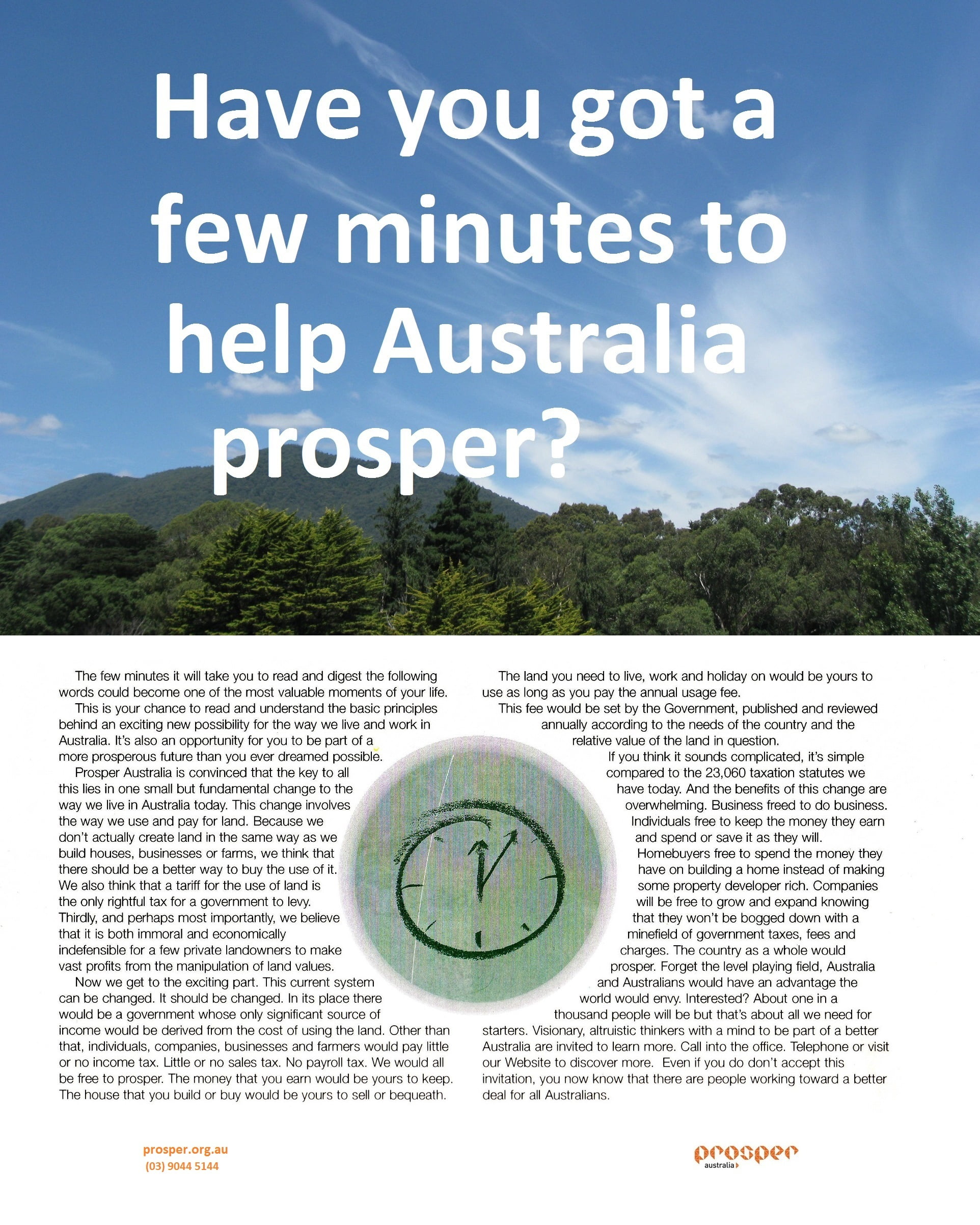…. and he cracks it for a good mention! –> http://isocracy.org/node/292
HOUSING IN OVER-SUPPLY IN OZ?
“SIX CAPITALS”, AND SAVING THE PLANET
 After reading Jane Gleeson-White’s SIX CAPITALS: The revolution capitalism has to have – or can accountants save the planet?, I was unfortunately forced to conclude, no, accountants will be unable to save the planet.
After reading Jane Gleeson-White’s SIX CAPITALS: The revolution capitalism has to have – or can accountants save the planet?, I was unfortunately forced to conclude, no, accountants will be unable to save the planet.
If we take the author’s chronicled approaches being tortuously undertaken by many well-meaning individuals, bodies, and companies in an effort to adopt an accounting model that might integrate ‘the six capitals’ (financial capital, manufactured capital, intellectual capital, human capital, social and relationship capital and, especially natural capital), we take an unnecessarily intricate and confusing path that offers no real hope of putting an end to the current pillage and devastation of our natural resources.
Gleeson-White has an obviously deep concern about the damage people and companies are wreaking upon our natural environment. She acknowledges economist Raj Patel was onto something with the real cost of a Big Mac being $200 if we are to account for its attendant carbon footprint, water usage, soil degradation and health care costs.
But the fundamentals of accounting for nature have eluded her.
The first step is to realise that every privately-owned block of land, whether a massive rural farm or tiny urban block, yields an income flow which is every bit as real as the flow of oil from a newly-established rig. This unearned income reflects the block’s inherent attributes, its size, shape and topography, in addition to the value added by all of its externalities, that is, as affected by such things as surrounding population, roads, highways, public transport, schools, hospitals, cultural and shopping facilities and nearby natural features. All of these will add in some measure to the annual income of each and every block. It is unnecessary to value public lands, including national parks and recreation reserves additionally because, although they are important, they all add some immeasurable measure of value to each parcel of land. Almost perfectly, land values capture all of these externalities or “spill-overs”. (Unfortunately, land prices are also currently capturing much of the benefits of production and innovation, but that’s another story altogether.)
Real estate valuers are aware of the rental value of land, but are not forthcoming about the rather obvious ethical matters that arise from it. Accountants and lawyers seem ignorant of the income flow from land, and economists go to great lengths to under-assess it – to about one-twentieth of its true value.
What did individuals do to create alienated land and its externalities? Nothing. The land is natural, it was always there, and the entire surrounding infrastructure was created by the community as a whole.
As this community-generated income is not captured for the revenue of the community, except in small amounts at local and state government level, individuals and companies will naturally aspire to achieve more and more of it. This is the real meaning of rent-seeking and, in not distinguishing between earned incomes and unearned rents, this is also where accounting and economics fail us.
The failure to pay the rent of our natural resources for government revenue gives the green light for “investors” and companies to continue ruthlessly to plunder them, directing themselves into our hinterlands and public lands for the sake of “jobs”. Our tax and accounting regimes give all the wrong signals if we are to save economies and preserve our natural heritage.
Anyone who would remedy how accounting mistreats our land, minerals, forests, spectrum and fisheries must first understand the extent of the rents that flow from them and that these, being unearned incomes, are owed back to the public purse.
Not to address this fundamental point leads to the current great confusion in accounting, finance, economics and politics.
Sorry, Jane, Six Capitals misses an opportunity. Paying a charge–a rent–for our ongoing use and abuse of nature is the only way to respect, save and preserve it.
OUT OF THE MOUTHS OF BABES …

GOOD READ MISSES A KEY POINT
 WAYNE SWAN CONTENDS: Repairing inequity is NOT class warfare!
WAYNE SWAN CONTENDS: Repairing inequity is NOT class warfare!
I enjoyed reading “The Good Fight“, Wayne Swan’s account of the Rudd-Gillard-Rudd federal governments’ “Six years, two prime ministers and staring down the Great Recession”. As you’d expect, it contains enlightening detail of the political comings-and-goings during Labor’s hectic and divided term from 24 November 2007 to 7 September 2013.
Whilst you’d expect the former Treasurer’s story to be self-serving, Wayne Swan does own up to several of his own errors, in addition to Kevin Rudd’s myriad which emerge, and the truthfulness of his account becomes patent. But there is one grave omission that amounts to a form of dishonesty. More on this later.
I got to the end of the book admiring Swan’s conviction in carrying on ‘the good fight’ and I believe he makes his most timely and important point in Appendix 2 “Land of Hope and Dreams”, a speech delivered in the John Button Lecture at the Wheeler Centre in Melbourne on 2 August 2012:-
Obviously, you have to make a pie before you can slice it—and I’m deeply proud that we’ve grown our national pie by nearly 10 per cent since the GFC—but eventually you do have to slice it. The choices you make in slicing the pie reflect fundamental moral judgments. They also reflect important economic judgments, because economically divided societies tend to be societies without a common purpose, without cohesion, without cooperation, and eventually without economic growth.
America’s leading economists now bear this out. From at least the early 1980s onwards, working class Americans have been losing their share of American prosperity while the wealthy have been gaining dramatically more. So much so that leading economists and sociologists like Paul Krugman, Joseph Stiglitz and Robert Putnam now observe that wealth inequality, not race, is the most important divisive factor in US society.
Swan is aware of the need for resource-based revenues in order to achieve a measure of public equity, and in respect of the Resource Super Profit Tax:-
Every Australian should be concerned about how the anti-mining-tax campaigners manipulated media coverage to support special interest over the public good. For example, the views of minor academic-turned-conservative-op-ed-columnist Judith Sloan were elevated above those Nobel Prize winners who supported the tax.
Like many Australians, Euromoney’s 2011 Finance Minister of the Year saw billionaires parading on a flatbed truck to put their case against Australians getting their fair share from exploitation of our minerals as a gross obscenity.
Because Australia was behind the curve in its land price bubble, Wayne Swan had time to forestall the country from going into recession during the GFC by undertaking a series of well-reported pump-priming episodes.
One is left wondering whether these stimuli were at least in part inspired by Swan’s 6:30 am directive in a telephone call from US Treasury secretary Hank Paulson on 10 January 2008: “‘Look … if we can avoid a meltdown in house prices, then we might be able to see a way through this’, he said.”
You also failed to comment on whether you see the worldwide rent-seeking epidemic in house prices—or, more particularly Australia’s current bubble in land prices–as every bit as obscene as Gina Rinehart’s rent-seeking in our mineral resources, Mr Swan. Nor did you mention that land tax was part of the Labor party policy until it was written (not voted) out of the party’s platform in the 1960s by party secretary Cyril Wyndham. Would not an all-in land tax have acted to obviate the build-up of this poised-to-burst bubble? Surely, these are important considerations not brought to light in your economic analysis? This omission, this void, is palpable.
Did not the late Labor stalwart Clyde Cameron contend this was where the party had lost its way, Mr Swan? You say you don’t want the GFC to be extended because of its regressive nature, so the void is remaining to be filled.
________________________
FLASH! Herald-Sun discovers negative gearing of real estate.
PROSPER MEDIA RELEASE
PROSPER AUSTRALIA MEDIA RELEASE
Debate over GST split ignores bigger issue
“The States should not be threatening to re-impose regressive taxes of the past, but be working with the Federal government to overcome the mis-information prevalent in a property obsessed economy,” stated Prosper Australia Project Director Karl Fitzgerald.
“Treasurer Hockey is concerned at the tax avoidance of Big Tech costing the budget some $5bn p.a. Yet unrealised capital gains in the land market were 84 times greater – a staggering $418.3bn last financial year.
“Land taxes are grossly under-utilised and must be part of the tax reform discussion at this Friday’s COAG meeting. The National Commission of Audit stated: “The States’ own-source revenue could be increased to reduce the vertical fiscal imbalance and provide them with fiscal autonomy. This includes options such as broadening the base of existing State taxes.” This is a coded call to remove the many exemptions from the Land Tax base.
“States should be working to reform their most powerful tax base – Land Tax. In the past few weeks two Treasury papers have extolled Land Taxes as the most efficient tax base available. Not one state Premier commented on this finding, tacitly agreeing to even greater federal subservience by allowing the second best GST to take centre stage.
“The political challenges to such reform are considerable but governments at all levels must engage in serious long term education campaigns on the benefits of Land Tax reform. This is urgently needed to offset the self-interest stoked by property shows such as The Block and Location, Location, Location.
“Instead, the state with the longest tradition of taxing land values, South Australia, is threatening to reinstate the unpopular Financial Institutions Duty as a payback for fiscal imbalance. Premier Jay Weatherill has strong views about the $275m Federal cut from the SA health budget. However, in the 2013-14 financial year, SA land values increased by $18.5bn. Whilst the size of the cutbacks are concerning, such an amount equates to just 1.5% of the land price appreciation.
“NSW is facing an onslaught from property investors chasing a slice of the $203bn in rising land prices. They face a cut of $1bn over four years but Premier Baird would rather privatise than consider a rollback of the rent-seeking frenzy surrounding his state.
“Victorian Premier Andrews wants to privatise the Port of Melbourne for a once off $6 billion budget bonus. That’s 5.6% of Victoria’s annual land price increase. The silence is deafening on the harm resultant mortgage debts are causing the Victorian economy. Instead Andrews is reversing the other way, offering handouts to the property lobby by capping municipal rates.
“In an age of capital mobility, taxing fixed assets such as land will become increasingly important. State governments must start to reclaim their sovereignty by engaging in the reforms suggested to the Victorian government in Prosper Australia’s pre-budget submission” closed Fitzgerald.
Media contact
Karl Fitzgerald
karl.fitzgerald@prosper.org.au
800 YEARS OF ENSLAVEMENT WORSE THAN FEUDALISM

IN FAVOUR OF LAND TAX
A letter in THE AGE today –> http://www.prosper.org.au/2015/04/13/in-favour-of-land-tax/


